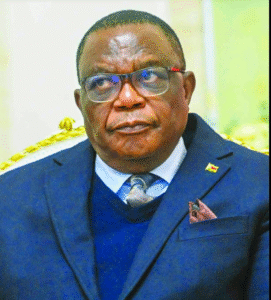ZIMBABWE’S DEMOCRACY UNDER ATTACK AS CCC CANDIDATES BARRED FROM BY-ELECTIONS
In a major blow to Zimbabwe’s democracy, the Citizens’ Coalition for Change (CCC), led by Nelson Chamisa, has been blocked from contesting in recent by-elections — a move widely seen as a calculated effort by the regime to dismantle political opposition and force the country towards a one-party state. This development has sparked outrage among citizens and political observers alike, raising serious concerns about the future of democratic participation in Zimbabwe.
The decision to prevent CCC candidates from participating in the December by-elections was triggered by a controversial legal manoeuvre spearheaded by Sengezo Tshabangu, who claims to be the party’s interim secretary-general. Tshabangu, long suspected of working in cahoots with the ruling ZANU PF and state security structures, has used the courts to recall opposition MPs and councillors. Now, the judiciary — accused of being compromised — has backed his decision to block CCC candidates from recontesting.
This brazen abuse of the legal system has brought Zimbabwe’s oversight institutions under scrutiny. Parliament, the courts, and even the Zimbabwe Electoral Commission (ZEC) have all been accused of enabling ZANU PF’s efforts to rig the political playing field. Speaker of Parliament Jacob Mudenda ignored a High Court order to stop the recalls. ZEC accepted Tshabangu’s recalls and disqualified popular opposition candidates without hesitation. And the courts, instead of upholding justice, have continued to side with Tshabangu in what many now consider a state-sanctioned political purge.
The impact on the opposition has been significant. CCC had shown real strength in the tightly contested August 23–24 general elections. Despite facing a well-resourced ruling party with access to state machinery, CCC won in key constituencies such as Cowdray Park in Bulawayo, where Pashor Sibanda defeated Finance Minister Mthuli Ncube, and Mabvuku-Tafara in Harare, where Munyaradzi Kufahakutizwi won against all odds.
But now, both Sibanda and Kufahakutizwi have been barred from standing again, following court rulings that many believe were politically influenced. Legal arguments have taken a back seat as the regime pushes forward with what critics call a judicial coup.
What’s happening in Zimbabwe today is reminiscent of the darkest days under the late Robert Mugabe. President Emmerson Mnangagwa, who promised reform and a break from the past when he came to power after the 2017 coup, is now using state institutions to silence dissent and cripple his opponents. This has led to widespread concern that Zimbabwe is sliding into a de facto one-party dictatorship.
Prominent analysts have spoken out. Academic and political commentator Ibbo Mandaza has called out the systematic dismantling of the opposition. International relations expert Professor Stephen Chan has even gone so far as to suggest that CCC may need to reconsider its entire political strategy, given the state capture of democratic institutions. Rashweat Mukundu, another respected voice in civil society, has argued that CCC should rethink its participation in Parliament and local councils altogether.
The situation is volatile. Citizens are growing restless. Disenfranchisement is breeding resentment, and many fear that continued repression could lead to civil disobedience or unrest. Zimbabwe’s democratic space is shrinking, and the trust between the governed and those in power is rapidly eroding.
This is not just about CCC or Nelson Chamisa. It is about the future of Zimbabwe. When courts are used to eliminate competition and when elections are manipulated through legal loopholes, then democracy becomes an illusion. The recent by-elections have exposed the extent of institutional decay and the dangerous levels of political manipulation now defining Zimbabwean politics.
The question now is whether the people of Zimbabwe, civil society, and the international community will allow this democratic backslide to continue unchecked — or whether they will rise to defend what remains of Zimbabwe’s shattered democratic dream.



